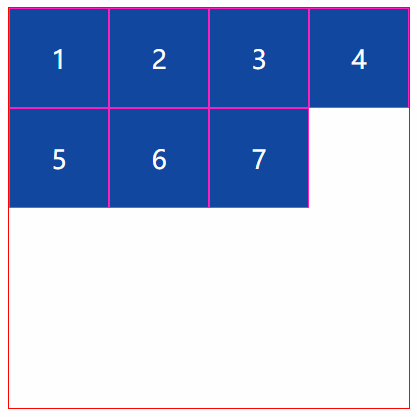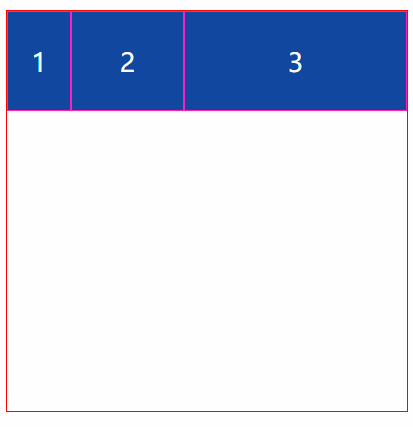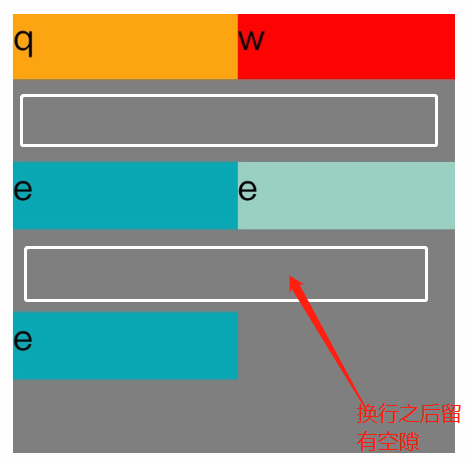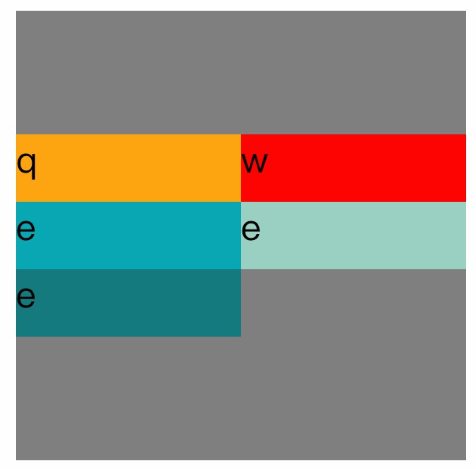CSS弹性布局(display:flex)
参考:
http://www.runoob.com/w3cnote/flex-grammar.html
https://www.jianshu.com/p/5856c4ae91f2
http://www.ruanyifeng.com/blog/2015/07/flex-grammar.html
https://www.cnblogs.com/xuyuntao/articles/6391728.html
主要内容:
父级: display:flex; (兼容绝大部分浏览器):-webkit- 真实工作下使用postCss插件-自动添加浏览器兼容 display: -webkit-flex; /* Safari */ display: flex; *如果使用了弹性布局,子元素不需要使用浮动float 父级身上的常用属性: justify-content: 子元素水平排列 flex-start(默认) 从左开始 flex-end 从右开始 center 居中!! space-between 两端对齐 space-around 子元素张开手分布 align-items 子元素垂直排列 flex-start(默认) 从上开始 flex-end 从下开始 center 居中!! stretch(默认值):如果项目未设置高度或设为auto,将占满整个容器的高度 baseline: 项目的第一行文字的基线对齐 align-content 多行子元素垂直排列 flex-start: 与交叉轴的起点对齐。 flex-end: 与交叉轴的终点对齐。 center: 与交叉轴的中点对齐。 space-between: 与交叉轴两端对齐,轴线之间的间隔平均分布。 space-around: 每根轴线两侧的间隔都相等。所以,轴线之间的间隔比轴线与边框的间隔大一倍。 stretch(默认值): 轴线占满整个交叉轴。 flex-flow(基本不用,面试可能会提到) flex-flow属性是flex-direction属性和flex-wrap属性的简写形式,默认值为row nowrap flex-flow: <flex-direction> <flex-wrap>; 举例:flex-flow:column wrap; flex-direction 子元素排列方向 row(默认值):主轴为水平方向,起点在左端。 row-reverse:主轴为水平方向,起点在右端。 column:主轴为垂直方向,起点在上沿。 column-reverse:主轴为垂直方向,起点在下沿。 flex-wrap 子元素一行排不下如何换行 nowrap(默认):不换行 wrap:换行,第一行在上方 wrap-reverse:换行,第一行在下方 子集身上的属性: flex 是flex-grow, flex-shrink 和 flex-basis的简写,默认值为0 1 auto。后两个属性可选 将行分为定义比例的几份 *子元素在划分父元素宽度,先刨除固定宽度 align-self 允许单个子元素有与其他项目不一样的垂直对齐方式,可覆盖align-items属性 .item { align-self: auto | flex-start | flex-end | center | baseline | stretch; } flex-grow 定义子元素的放大比例,默认为0,即如果存在剩余空间,也不放大 .item { flex-grow: <number>; /* default 0 */ <number>只代表缩放系数 } order 定义子元素的排列顺序。数值越小,排列越靠前,默认为0 .item { order: <integer>; }
练习案例:


<!DOCTYPE html> <html lang="en"> <head> <meta charset="UTF-8"> <title>flex布局案例-淘宝底部导航栏</title> <link rel="stylesheet" href="bootstrap/css/bootstrap.css"> <style> * { margin: 0; padding: 0; list-style: none; } .footer-nav{ width: 100%; height: 60px; background-color: grey; display: flex; position: absolute; left: 0; bottom: 0; } .footer-nav .tab{ width: 20%; box-sizing: border-box; border-left: 1px solid red; flex: 1; text-align: center; line-height: 30px; font-size: 16px; color: white; } .footer-nav .tab .tab-icon{ height: 30%; } </style> </head> <body> <div class="footer-box"> <div class="footer-nav"> <span class="tab"> <span class="tab-icon glyphicon glyphicon-home"></span> <p class="text">首页</p> </span> <span class="tab"> <span class="tab-icon glyphicon glyphicon-shopping-cart"></span> <p class="text">购物车</p> </span> <span class="tab"> <span class="tab-icon glyphicon glyphicon-list-alt"></span> <p class="text">订单列表</p> </span> <span class="tab"> <span class="tab-icon glyphicon glyphicon-user"></span> <p class="text">我的淘宝</p> </span> <span class="tab"> <span class="tab-icon glyphicon glyphicon-option-horizontal"></span> <p class="text">更多</p> </span> <span class="tab"> <span class="tab-icon glyphicon glyphicon-grain"></span> <p class="text">欢度清明</p> </span> </div> </div> </body> </html>


<!DOCTYPE html> <html lang="en"> <head> <meta charset="UTF-8"> <title>Title</title> <link rel="stylesheet" href="style/flex-1.css"> </head> <body> <div class="outer"> <div class="item div1">1</div> <div class="item div2">2</div> <div class="item div3">3</div> <div class="item div4">4</div> <div class="item">5</div> <div class="item">6</div> <div class="item">7</div> </div> </body> </html>

*{ margin: 0; padding: 0; list-style: none; } .outer{ width: 500px; height: 500px; border: 1px solid red; margin: 30px auto; display: flex; flex-wrap: wrap; align-content:flex-start; } .item{ width: 125px; border: 1px solid #ff1bbe; background-color: #0D47A1; height: 125px; box-sizing: border-box; font-size: 32px; color: white; line-height: 125px; text-align: center; align-content: flex-start; }


<!DOCTYPE html> <html lang="en"> <head> <meta charset="UTF-8"> <title>Title</title> <style> * { margin: 0; padding: 0; list-style: none; } .outer { width: 500px; height: 500px; border: 1px solid red; margin: 30px auto; display: flex; flex-wrap: wrap; align-content: flex-start; } .item { border: 1px solid #ff1bbe; background-color: #0D47A1; height: 125px; box-sizing: border-box; font-size: 32px; color: white; line-height: 125px; text-align: center; } .div1{width: 80px} .div2{flex: 1} .div3{flex: 2} </style> </head> <body> <div class="outer"> <div class="item div1">1</div> <div class="item div2">2</div> <div class="item div3">3</div> </div> </body> </html>



<!DOCTYPE=html> <html lang="zh-cn"> <head> <meta charset="UTF-8"> <title> 关于文档元素测试 </title> <style> #father{ width:200px; display:flex; flex-direction:row; flex-wrap:wrap; align-content:center; height:200px; background-color:grey; } .son1{ height:30px; width:100px; background-color:orange; } .son2{ height:30px; width:100px; background-color:red; } .son3{ height:30px; width:100px; background-color:#08a9b5; } .son4{ height:30px; width:100px; background-color:#9ad1c3; } .son5{ height:30px; width:100px; background-color:rgb(21,123,126); } </style> </head> <body> <div id="father"> <div class="son1">q</div> <div class="son2">w</div> <div class="son3">e</div> <div class="son4">e</div> <div class="son5">e</div> </div> </body> </html>
